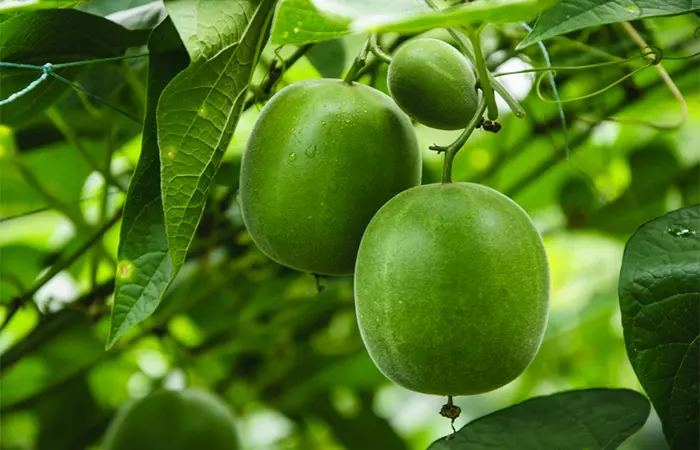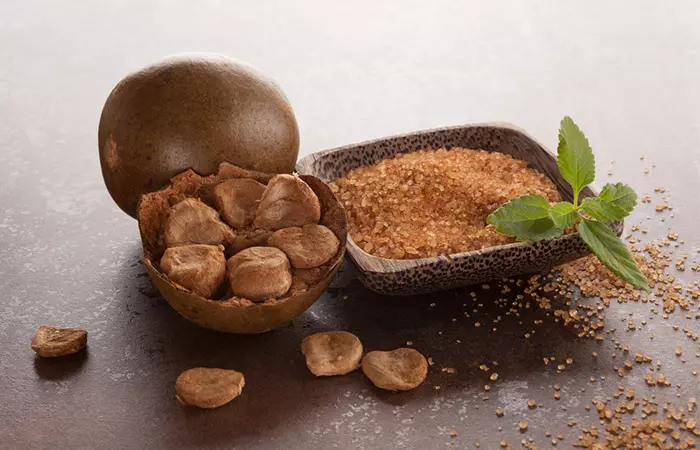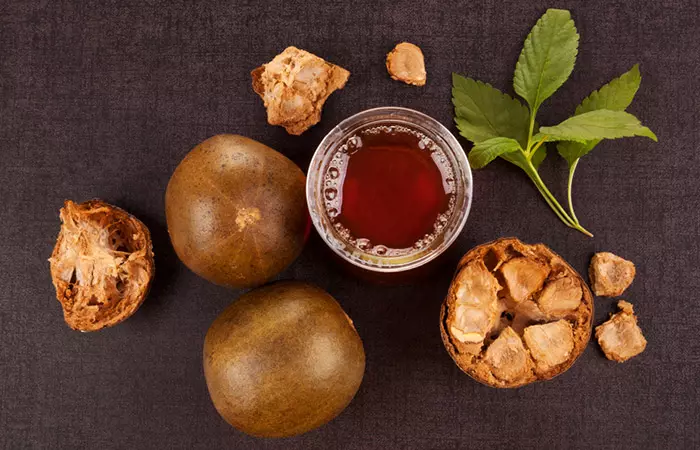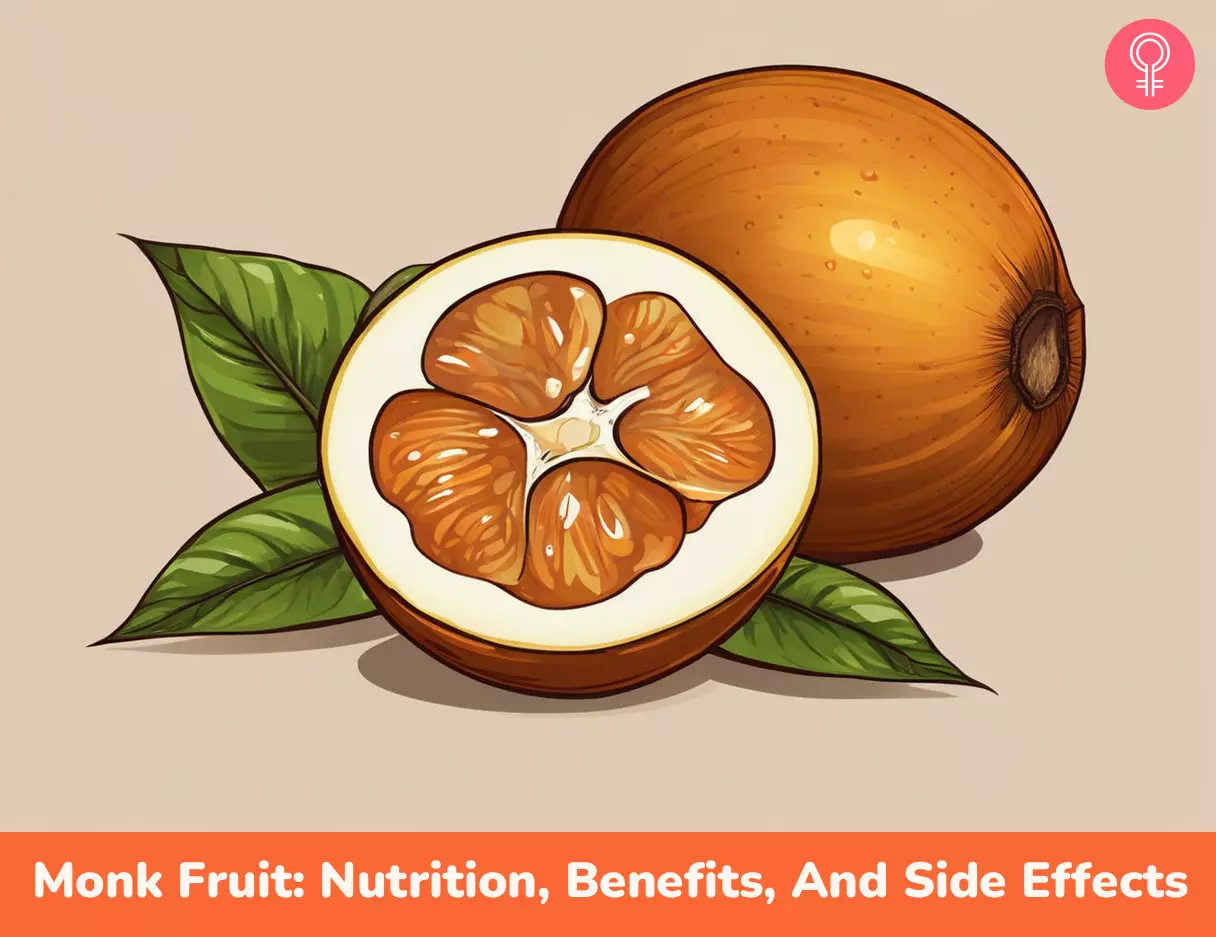Famous for its intense sweetness, monk fruit can be a healthy solution for your sugar cravings and hunger pangs. Since this sweetness is almost harmless, monk fruit sugar has become a savior for fitness folks and people with insulin resistancei The inability of cells to respond to insulin hormones that leads to elevated blood sugar levels or diabetes. . Let’s explore more about the qualities of this ordinary-looking gem of a fruit.
What Is Monk Fruit?
Monk fruit is brownish-yellow melon-like fruit with a smooth outer covering and a diameter of up to 4-7 cm. Traditionally known as lo han guo, monk fruit grows on a herbaceous vine that predominantly grows in southern China’s Guangxi province. It takes its name after the Chinese monks who grew it centuries ago (1).
Is Monk Fruit Healthy?
Raw monk fruit is a rich source of vitamins, antioxidants, and dietary fibers, which are otherwise under-consumed. It is traditionally used as a remedy for lung problems, treating sunstroke, dehydration, bowel discomfort, throat problems, coughs, and colds. The fruit also has various bioactive compounds, which are very good for health (1). Owing to its many benefits, monk fruit extracts are widely used to make natural sweeteners.
What Is Monk Fruit Sweetener?
Monk fruit sweetener is a concentrated form of the dried fruit extracts and is 300 times (or around 150-200 times as per some researchers) sweeter than sugar (1). It is prepared from the fruit’s dried extracts in three steps: Jo Jo Wang, a blogger, shares how she adds a sweetener made with monk fruit. instead of granulated sugar, to make a sponge cake. She writes, “ They extract the juice of monk fruit, dry it, then add erythritol to make it more palatable. I tasted it at the booth, it does taste and look like granulated sugar (i).” Monk fruit sweetener contains zero calories and carbohydrates (2). Let’s take a look at its nutritional profile.
Monk Fruit: Nutrition Facts And Glycemic Index (GI)
Monk fruit sweetener has zero glycemic index; therefore, it does not increase blood sugar levels. Fresh monk fruit contains the following nutrients (1): Monk fruit products are believed to be a healthy alternative to simple sugar when trying to lose weight and manage metabolic health. Monk fruit and its sweeteners are accepted as GRAS (Generally Recognised as Safe) food by FDA (3). Due to its excellent nutritional qualities, monk fruit may benefit your health in many ways.
Health Benefits Of Monk Fruit And Its Sweetener
1. May Help In Weight Loss
Studies conducted on mice found that monk fruit extracts could promote weight loss. The fruit contains bioactive compounds like mogrosides, especially mogroside IV and V, which inhibit the production of lipase (digestive enzyme) in the pancreas. This suppresses appetite, increases satiety, and may help in weight management. The oral intake of mogrosides may also reduce triglycerides and total cholesterol levels (1). The low calorific value also makes it keto-friendly. However, further trials on humans are required to substantiate these claims.
2. May Reduce Inflammation
Monk fruit may reduce oxidative stress in the body and prevent inflammation. An animal study showed that the mogroside V found in monk fruit may alleviate the inflammatory response of porcine alveolar macrophages (a type of white blood cell) (1), (4). Therefore, it may have a protective effect and help manage the symptoms of inflammatory conditions. However, further research is required to conclude its efficacy in humans.
3. May Maintain Sugar Levels
Monk fruit may have anti-diabetic effects by enhancing the rate of blood glucose uptake The mogrosides in the fruit has free radical scavenging properties and may reduce oxidative stress, which is one of the factors responsible for diabetes (1). A study on rats also found that monk fruit has anti-hyperglycemici The agents with anti-hyperglycemic properties counter the accumulation of excess glucose in the blood. and anti-hyperlipidemici The agents with anti-hyperlipidemic properties help reduce bad cholesterol and may also increase good cholesterol. properties and could help control blood sugar levels and improve lipid profile (5). However, further human studies are required to substantiate the claims. All these health benefits may make you switch to monk fruit sweeteners immediately. While you may use monk fruit sweetener to balance your meals with other carbs without the sugar overload, it is essential to watch out for possible side effects.
Side Effects Of Monk Fruit
Although it is safe to consume, monk fruit’s side effects may include allergic reactions. The symptoms may include:
Rashes Breathing issues Irregular heartbeat, Dizziness Swollen tongue Abdominal pain Wheezing
Monk fruit sweeteners may contain erythritol, another sugar substitute, which may also cause allergic reactions (6). In case you experience any side effects, discontinue using monk fruit sweetener and consult a doctor immediately. Also, the products containing monk fruit sweeteners may still have added calories. It is advised to check the labels for GI and calorific values of the monk fruit product, as they may differ across the brands. Also, make sure you go for non-GMO sweeteners that do not contain any harmful ingredients. The following sections cover everything you need to know about this low-calorie fruit’s impact on blood sugar levels.
Does Monk Fruit Raise Blood Sugar?
No. Monk fruit does not raise blood sugar levels. The extracts get their iconic sweetness from mogrosides compounds, which aren’t absorbed by the body and get excreted with the urine (7). Thus, they do not add calories or raise blood sugar levels. Wondering if it is safe to consume if you have diabetes? Let us find out.
Is Monk Fruit Suitable For People With Diabetes?
Due to its intense level of sweetness, low calorific value, and zero glycemic index, monk fruit extracts could be an ideal replacement for sugar for people with diabetes and obesity (8). Although the FDA did not specify an acceptable daily intake (ADI), it recognizes monk fruit sweeteners as safe for people with diabetes (9). Moreover, the compound erythritol used in these sweeteners is observed to improve glucose tolerance in mice (10). Moreover, erythritol benefits your health in many ways, and its positive effects are quite well-known. This sweetener may also help with weight management. Now that you know monk fruit and its extracts are diabetes-friendly, here’s how you can include it in your diet in various ways.
How To Eat Monk Fruit
Monk fruit has a short shelf life in its raw form. It turns rancid within a few days. You may find it available in dried form, which you can use to prepare:
Tea Juice, smoothies, etc. Salad seasoning Ice cream and yogurt Mousse and frostings Porridge, pudding, and oatmeal
You can add monk fruit sugar and sweetener to your foods and beverages. Is your mouth already watering? Then, it is time to dig into some delicious monk fruit recipes.
3 Easy Monk Fruit Recipes
Cooking or baking with monk fruit sweetener is easy as it holds high temperatures very well and mixes well with other ingredients. Here are 3 easy-to-prepare recipes with monk fruit.
1. Peanut Butter Cookie
You Will Need
100 grams natural peanut butter Monk fruit sugar 2 Eggs
Method
2. Monk Fruit Tea
You Will Need
1 dried monk fruit 1 ½ liter of water
Method
3. Coconut And Monk Fruit Balls
You Will Need
2 egg whites 1 ½ teaspoons of cornstarch 50 grams monk fruit sweetener 140 grams dried desiccated coconut
Method
Final Thoughts
Does monk fruit affect the pancreas? No. It does not affect the pancreas. However, it may help prevent the proliferation of pancreatic cancer cells (11). Is monk fruit or stevia better? Both monk fruit and stevia are plant-based artificial sweeteners with the same purpose – to treat taste buds with sweetness minus the calorie load. Try both to check out which one you like the most. You can even have the best of both worlds occasionally. Is monk fruit hard on the stomach? No. Monk fruit is not hard on the stomach. Traditionally monk fruit is used to combat gut-related disorders. Monk fruit sweetener is also harmless for the gut but may experience discomfort if allergic to it. Does monk fruit cause gas? No. Monk fruit does not cause gas, bloating, or other abdominal issues.
Illustration: Monk Fruit: Nutrition Benefits And Side Effects
Uncover the secrets of Monk Fruit and its benefits in this enlightening video. Explore this natural sweetener and enhance your healthy lifestyle. Watch now and embrace the power of nature.












